AWM41 1008 - [Nurses Narratives] Staff-Nurse J M Mathews - Part 2
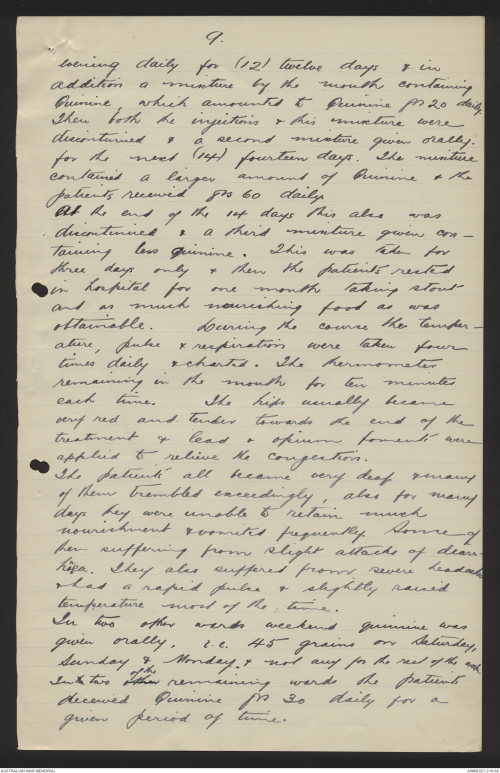
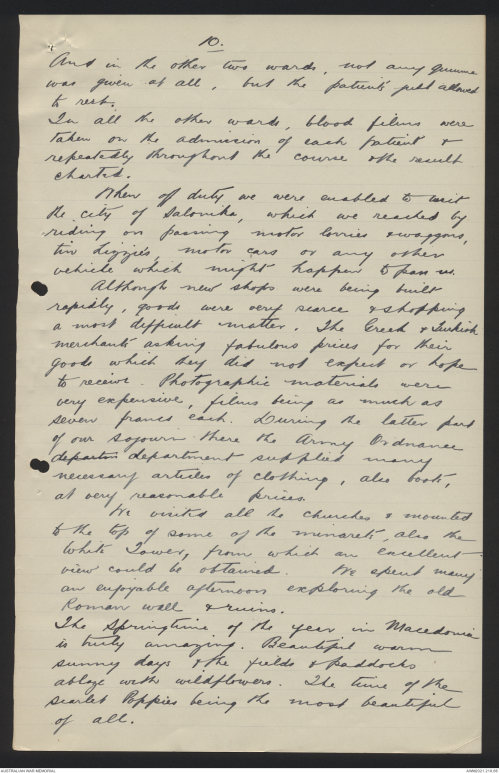
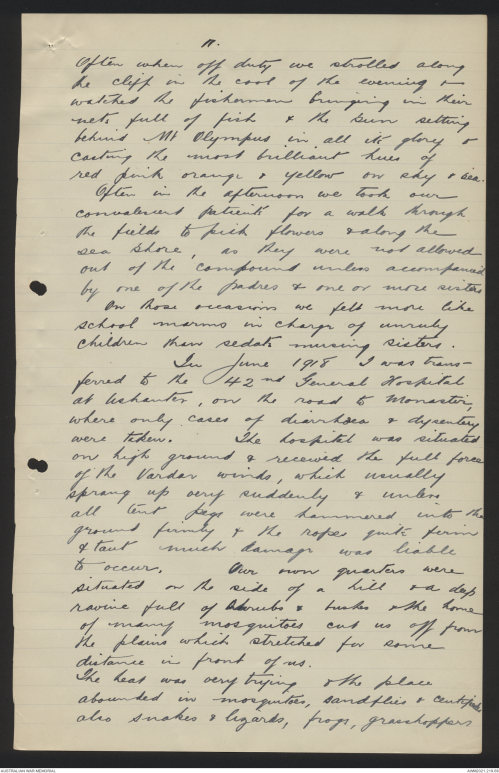
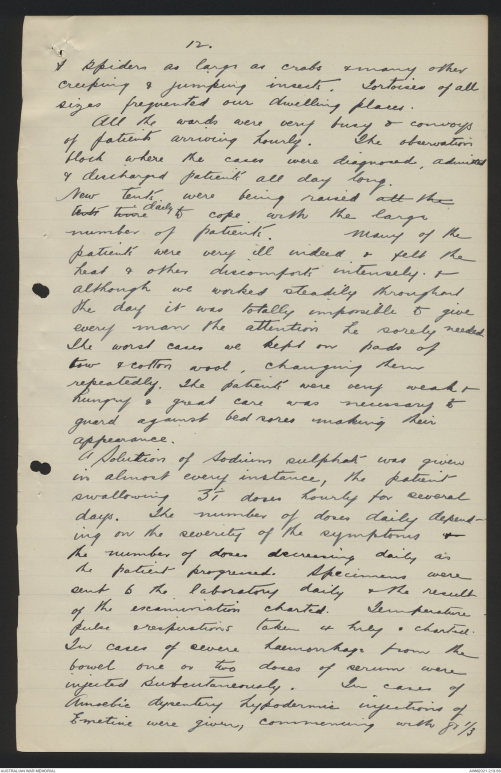
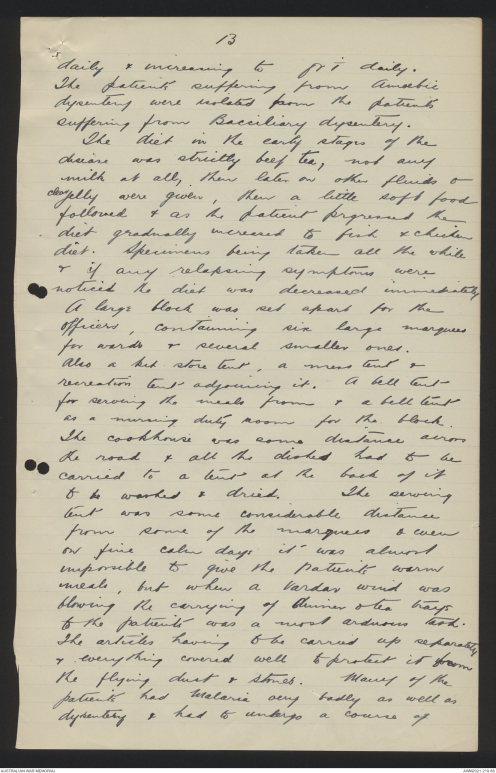
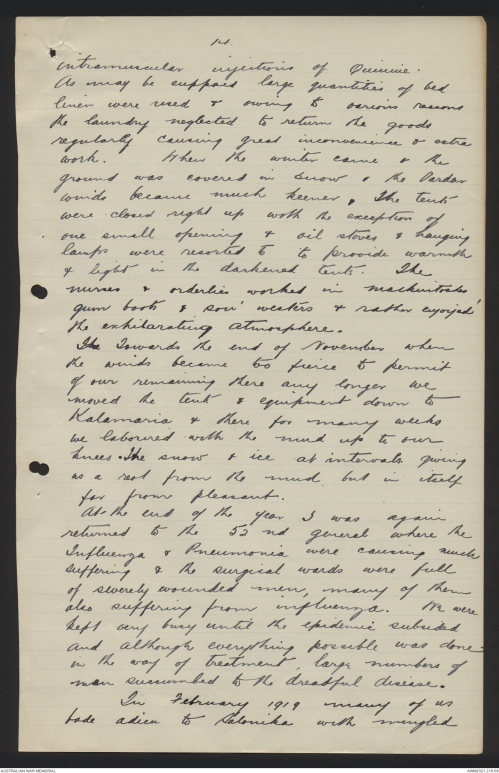
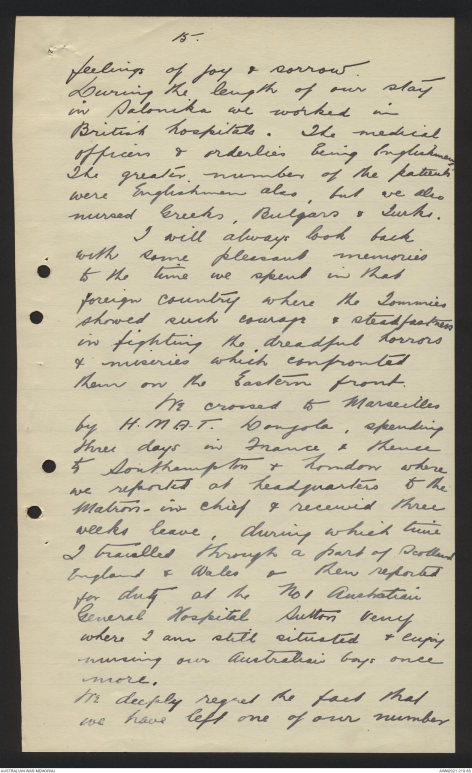
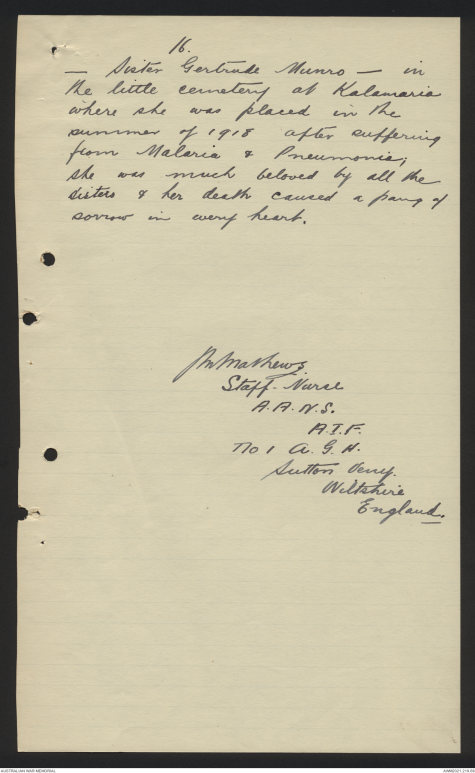
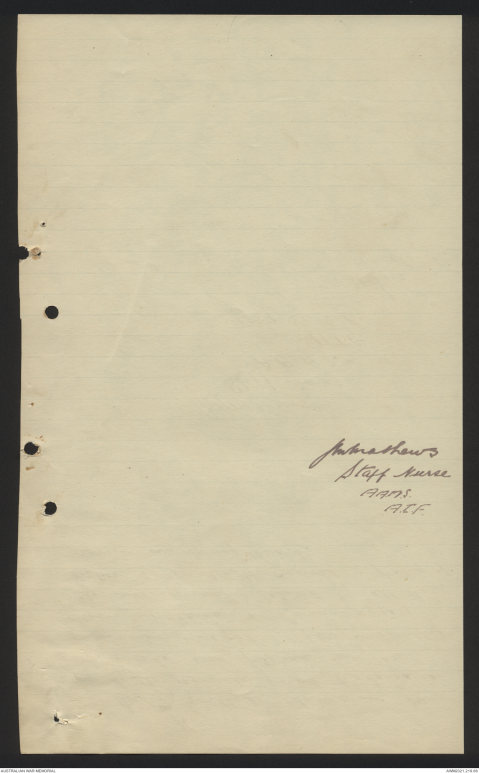
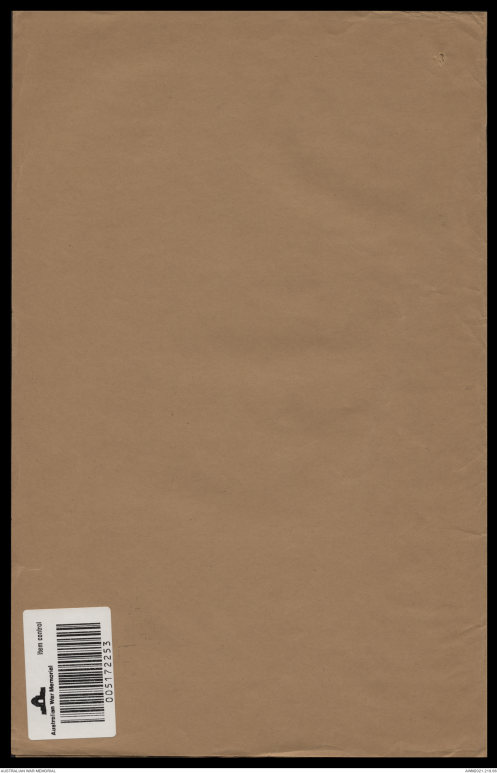
9.
evening daily for (12) twelve days & in
addition a mixture by the mouth containing
Quinine, which amounts to Quinine grs 20 daily.
Then both the injections & this mixture were
discontinued & a second mixture given orally.
for the next (14) fourteen days. The mixture
contained a larger amount of Quinine & the
patients received grs 60 daily.
At the end of the 14 days this also was
discontinued & a third mixture given containing
less Quinine. This was taken for
three days only & then the patients rested
in hospital for one month taking stout
and as much nourishing food as was
obtainable. During the course the temperature,
pulse & respiration were taken four
times daily & charted. The thermometer
remaining in the mouth for ten minutes
each time. The hips usually became
very red and tender towards the end of the
treatment & lead & opium foments were
applied to relieve the congestion.
The patients all became very deaf & many
of them trembled exceedingly, also for many
days they were unable to retain much
nourishment & vomited frequently. Some of
them suffering from slight attacks of diarrho^rea.
They also suffered from severe headaches
& has a rapid pulse & slightly raised
temperature most of the time.
In two other wards weekend quinine was
given orally, i.e. 45 grains on Saturday,
Sunday & Monday & not any for the rest of the week.
In to two other of the remaining wards the patients
received Quinine grs 30 daily for a
given period of time.
10.
And in the other two wards, not any quinine
was given at all, but the patients just allowed
to rest.
In all the other wards, blood films were
taken on the admission of each patient &
repeatedly throughout the course & the result
charted.
When off duty we were enabled to visit
the city of Salonika, which we reached by
riding on passing motor lorries & waggons,
tin Lizzies, motor cars or any other
vehicle which might happen to pass us.
Although new shops were being built
rapidly, goods were very scarce & shopping
a most difficult matter. The Greek & Turkish
merchants asking fabulous prices for their
goods which they did not expect or hope
to receive. Photographic materials were
very expensive, films being as much as
seven francs each. During the latter part
of our sojourn there the Army Ordnancedepartin department supplied many
necessary articles of clothing, also boots,
at very reasonable prices
We visited all to churches & mounted
to the top of some of the minarets, also the
White Tower, from which an excellent
view could be obtained. We spent many
an enjoyable afternoon exploring the old
Roman wall & ruins
The springtime of the year in Macedonia
is truly amazing. Beautiful warm
sunny days & the fields & paddocks
ablaze with wildflowers. The time of the
scarlet Poppies being the most beautiful
of all.
11.
Often when off duty we strolled along
the cliff in the cool of the evening &
watched the fishermen bringing in their
nets full of fish & the sun setting
behind Mt Olympus in all it glory &
casting the most brilliant hues of
red pink orange & yellow on sky & sea.
Often in the afternoon we took our
convalescent patients for a walk through
the fields to pick flowers & along the
sea shore, as they were not allowed
out of the compound unless accompanied
by one of the padres & one or more sisters.
On those occasions we felt more like
school marms in charge of unruly
children than sedate nursing sisters.
In June 1918 I was transferred
to the 42nd General Hospital
at Whanter, on the road to Monaster,
where only cases of diarrhorea & dysentery
were taken. The hospital was situated
on high ground & received the full force
of the Vardar winds, which usually
sprang up very suddenly & under
all tent pegs were hammered into the
ground firmly & the ropes quite firm
& taut much damage was liable
to occur. Our own quarters were
situated on the side of a hill & a deep
ravine full of shrubs & bushes & the home
of many mosquitoes cut us off from
the plains which stretched for some
distance in front of us
The heat was very trying & the place
abounded in mosquitoes, sandflies & centipedes
also snakes & lizards, frogs, grasshoppers
12.
& spiders as large as crabs & many other
creeping & jumping insects. Tortoises of all
sizes frequented our dwelling places.
All the wards were very busy & convoys
of patients arriving hourly. The observation
block where the cases were diagnosed, admitted
& discharged patients all day long.
New tents were being raised all thetents time daily to cope with the large
number of patients. Many of the
patients were very ill indeed & felt the
heat & other discomforts intensely &
although we worked steadily throughout
the day it was totally impossible to give
every man the attention he sorely needed
The worst cases we kept on pads of
tow & cotton wool, changing them
repeatedly. The patients were very weak &
hungry & great care was necessary to
guard against bed sores making their
appearance.
A Solution of Sodium sulphat was given
in almost every instance, the patient
swallowing 3T doses hourly for several
days. The number of doses daily depending
on the severity of the symptoms &
the number of doses decreasing daily as
the patient progressed. Specimens were
sent to the laboratory daily & the result
of the examination charted. Temperature
pulse & respirations taken 4 hrly & charted.
In cases of severe haemorrhage from the
bowel one or two doses of serum were
injected subcutaneously. In cases of
Amoebic dysentery hypodermic injections of
Emetine were given commencing with gr 1/3
13
daily & increasing to gr T daily
The patients suffering from Amoebic
dysentery were isolated from the patients
suffering from Bacciliary dysentery.
The diet in the early stages of the
disease was strictly beef tea, not any
milk at all, then later on other fluids &
clear jelly were given, then a little soft food
followed & as the patient progressed then
diet gradually increased to fish & chicken
diet. Specimens being taken all the while
& if any relapsing symptoms were
noticed the diet was decreased immediately
A large block was set apart for the
officers, containing six large marquees
for wards & several smaller ones.
Also a kit store tent, a mens tent &
recreation tent adjoining it. A bell tent
for serving the meals from & a bell tent
as a nursing duty room for the block.
The cookhouse was some distance across
the road & all the dishes had to be
carried to a tent at the back of it
to be washed & dried. The serving
tent was some considerable distance
from some of the marquees & even
on fine calm days it was almost
impossible to give the patients warm
meals, but when a Vardar wind was
blowing the carrying of dinner & tea trays
to the patients was a most arduous task.
The articles having to be carried up separately
& everything covered well to protect it from
the flying dust & stones. Many of the
patients had Malaria very badly as well as
dysentery & had to undergo a course of
14
intramuscular injections of Quinine.
As may be supposed large quantities of bed
linen were used & owing to serious reasons
the laundry neglected to return the goods
regularly causing great inconvenience & extra
work. When the winter came & the
ground was covered in snow & the Vardar
winds became much keener, the tents
were closed right up with the exception of
one small opening & oil stoves & hanging
lamps were resorted to to provide warmth
& light in the darkened tents. The
nurses & orderlies worked in mackintoshes
gum boots & sou'westers & rather enjoyed
the exhilarating atmosphere.
Then towards the end of November when
the winds became too fierce to permit
of our remaining there any longer we
moved the tent & equipment down to
Kalamaria & there for many weeks
we laboured with the mud up to our
knees. The snow & ice at intervals giving
us a rest from the mud, but in itself
far from pleasant.
At the end of the year I was again
returned to the 52nd General where the
Influenza & Pneumonia were causing much
suffering & the surgical wards were full
of severely wounded men, many of them
also suffering from influenza. We were
kept very busy until the epidemic subsided
and although everything possible was done
in the way of treatment, large numbers of
men succumbed to the dreadful disease.
In February 1919 many of us
bade adieu to Salonika with mingled
15.
feelings of joy & sorrow.
During the length of our stay
in Salonika we worked in
British hospitals. The medical
officers & orderlies being Englishmen.
The greater number of the patients
were Englishmen also, but we also
nursed Greeks, Bulgars & Turks.
I will always look back
with some pleasant memories
to the time we spent in that
foreign country where the Tommies
showed such courage & steadfastness
in fighting the dreadful horrors
& miseries which confronted
them on the Eastern front.
We crossed to Marseilles
by H.MA.T Dongola, spending
three days in France & thence
to Southampton & London where
we reported at headquarters to the
Matron-in-chief & received three
weeks leave, during which time
I travelled through a part of Scotland
England & Wales & then reported
for duty at the No 1 Australian
General Hospital Sutton Veny
where I am still situated & enjoy
nursing our Australian boys once
more.
We deeply regret the fact that
we have left one of our number
16
- Sister Gertrude Munro – in
the little cemetery at Kalamaria
where she was placed in the
summer of 1918 after suffering
from Malaria & Pneumonia;
she was much beloved by all the
Sisters & her death caused a pang of
sorrow in every heart.
JM Mathews
Staff. Nurse
A.A.N.S.
A.I.F.
No 1 A.G.H.
Sutton Veny.
Wiltshire
England.
JM Mathews
Staff Nurse
AA.M.S.
A.I.F.
Item Control
Australian War Memorial
005172253
 Sam scott
Sam scottThis transcription item is now locked to you for editing. To release the lock either Save your changes or Cancel.
This lock will be automatically released after 60 minutes of inactivity.